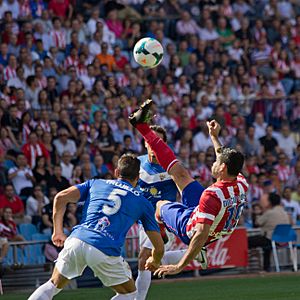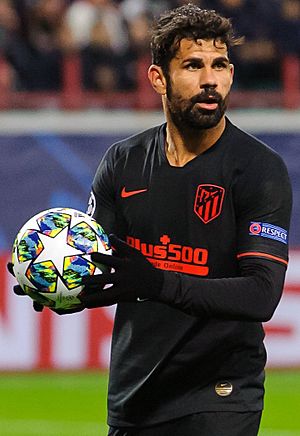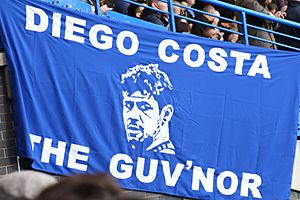Diego Costa facts for kids
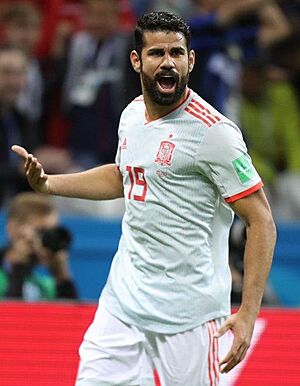
Costa with the Spain at the 2018 FIFA World Cup
|
|||
| Personal information | |||
|---|---|---|---|
| Full name | Diego da Silva Costa | ||
| Date of birth | 7 October 1988 | ||
| Place of birth | Lagarto, Sergipe, Brazil | ||
| Height | 1.86 m (6 ft 1 in) | ||
| Position(s) | Striker | ||
| Youth career | |||
| 2004–2006 | Barcelona de Capela | ||
| Senior career* | |||
| Years | Team | Apps | (Gls) |
| 2006 | Braga | 0 | (0) |
| 2006 | → Penafiel (loan) | 13 | (5) |
| 2007–2009 | Atlético Madrid | 0 | (0) |
| 2007 | → Braga (loan) | 6 | (0) |
| 2007–2008 | → Celta (loan) | 30 | (6) |
| 2008–2009 | → Albacete (loan) | 35 | (10) |
| 2009–2010 | Valladolid | 34 | (8) |
| 2010–2014 | Atlético Madrid | 94 | (43) |
| 2012 | → Rayo Vallecano (loan) | 16 | (10) |
| 2014–2017 | Chelsea | 89 | (52) |
| 2017–2020 | Atlético Madrid | 61 | (12) |
| 2021–2022 | Atlético Mineiro | 15 | (4) |
| 2022–2023 | Wolverhampton Wanderers | 23 | (1) |
| 2023 | Botafogo | 12 | (3) |
| 2024 | Grêmio | 20 | (7) |
| International career | |||
| 2013 | Brazil | 2 | (0) |
| 2014–2018 | Spain | 24 | (10) |
| *Club domestic league appearances and goals, correct as of 22:43, 8 December 2024 (UTC) | |||
Diego da Silva Costa (born 7 October 1988) is a professional footballer who plays as a striker. He is known for his goalscoring ability and competitive style of play.
Costa began his career in his home country of Brazil before moving to Portugal to join Braga in 2006. He was soon signed by Atlético Madrid in Spain. After several loan spells at other clubs, he became a star player for Atlético. He helped them win the Spanish La Liga title and reach the 2014 UEFA Champions League final.
In 2014, Costa joined the English club Chelsea for €35 million. In London, he won two Premier League titles and a League Cup. He returned to Atlético Madrid in 2018, where he won the UEFA Europa League and another UEFA Super Cup.
Costa was born in Brazil and played for their national team twice. However, he later chose to represent Spain after becoming a Spanish citizen. He played for Spain in the 2014 and 2018 FIFA World Cups. He is known for his strong and passionate personality on the field, which has sometimes led to conflicts with opponents.
Contents
Early Life
Diego Costa was born in Lagarto, Brazil. His father, a big football fan, named him after the famous Argentine player Diego Maradona. Costa grew up playing street football and never thought he would become a professional player because his town was very remote.
At age 15, he moved to São Paulo and started playing for a youth team called Barcelona Esportivo Capela. This was the first time he received any formal football coaching. His talent was noticed by a famous agent, Jorge Mendes, who offered him a contract to play in Europe for Braga in Portugal. Costa's father was worried about him moving so far away, but Diego was determined to take the chance.
Club Career
Early Career in Portugal and Spain
Costa signed with Braga in 2006 but found it hard to adjust to the new country. He was loaned to Penafiel, a team in a lower division, where he played well. His performance caught the eye of the Spanish club Atlético Madrid, who signed him in 2007.
For the next few years, Atlético loaned him to other Spanish clubs like Celta Vigo and Albacete. These loans helped him gain experience. In 2009, he was sold to Real Valladolid, where he was the team's top goalscorer for the season.
Return to Atlético Madrid
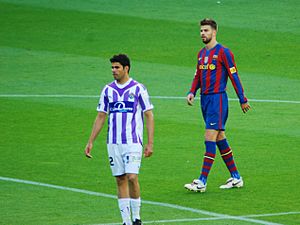
In 2010, Costa returned to Atlético Madrid. At first, he was a backup for star strikers Sergio Agüero and Diego Forlán. After an injury and a successful loan spell at Rayo Vallecano, where he scored 10 goals in 16 games, Costa came back to Atlético as a much-improved player.
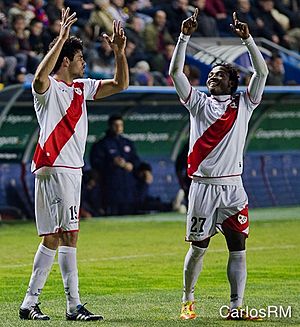
He became a key player under manager Diego Simeone. In the 2013 Copa del Rey Final, he scored the equalizing goal against rivals Real Madrid, helping Atlético win the cup for the first time in 14 years. He finished as the top scorer of the tournament with eight goals.
The Championship Season
The 2013–14 season was Costa's best. He scored 27 goals in La Liga, helping Atlético win the league title for the first time since 1996. He also scored eight goals in the UEFA Champions League, leading the team to the final. Unfortunately, he got injured early in the final match, which Atlético lost to Real Madrid. His amazing performances made him one of the most wanted strikers in Europe.
Chelsea
In July 2014, Costa signed for Premier League club Chelsea for a fee of £32 million. He started brilliantly, scoring in his first game and netting a hat-trick in his fourth match. He scored 20 goals in his first season, helping Chelsea win the Premier League and the League Cup.
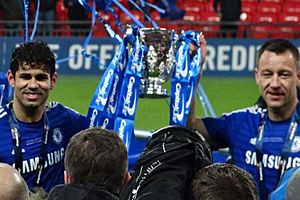
Costa's second season was more difficult, but he found his form again under new manager Guus Hiddink. In the 2016–17 season, under manager Antonio Conte, Costa was back to his best. He scored 20 goals and won his second Premier League title. He also scored in the 2017 FA Cup Final, but Chelsea lost to Arsenal.
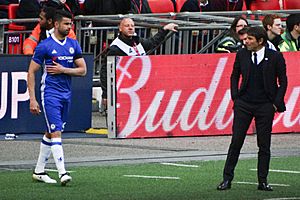
In 2017, after a disagreement with Conte, Costa was told he was no longer in the club's plans. He decided he wanted to return to Atlético Madrid.
Second Spell at Atlético Madrid
Costa rejoined Atlético Madrid in January 2018. He scored in his first game back. He helped the team win the 2018 UEFA Europa League, scoring the winning goal in the semi-final against Arsenal. He also scored two goals against Real Madrid in the 2018 UEFA Super Cup, which Atlético won. He left the club in December 2020.
Later Career
After leaving Atlético, Costa played for Atlético Mineiro in Brazil, where he won the Brazilian league and cup in 2021. In 2022, he returned to the Premier League, joining Wolverhampton Wanderers. He later played for Botafogo in Brazil before joining Grêmio in 2024.
International Career
Choosing Between Brazil and Spain
Costa was born in Brazil and played two friendly matches for the Brazil national team in 2013. However, because he had gained Spanish citizenship, he was also eligible to play for Spain.
In October 2013, Costa announced his decision to play for Spain. This was a controversial choice, and the head coach of Brazil expressed his disappointment. Costa wanted to represent the country where he had spent most of his professional career.
Playing for Spain
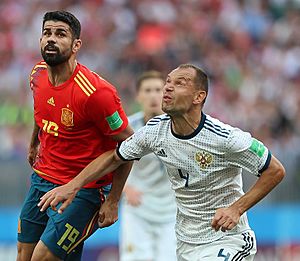
Costa made his debut for Spain in March 2014. He was selected for the 2014 FIFA World Cup squad. He later played in the 2018 FIFA World Cup, where he scored three goals, including two against Portugal in a thrilling 3–3 draw. In total, he played 24 times for Spain and scored 10 goals.
Style of Play
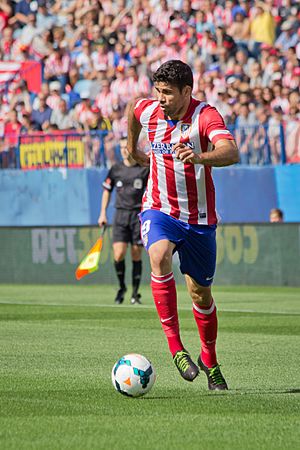
Costa is known for his powerful and aggressive style of play. He is a strong striker who is good at holding up the ball and bringing his teammates into the game. He is also quick and tireless, always chasing down defenders. His manager at Atlético, Diego Simeone, praised his work rate as "contagious."
While his competitive nature sometimes leads to arguments with opponents, it is also what makes him a determined and successful player. He is a talented goalscorer with great technique, known for his ability to create chances for himself and his team.
Career statistics
Club
| Club | Season | League | National cup | League cup | Continental | Other | Total | |||||||
|---|---|---|---|---|---|---|---|---|---|---|---|---|---|---|
| Division | Apps | Goals | Apps | Goals | Apps | Goals | Apps | Goals | Apps | Goals | Apps | Goals | ||
| Penafiel (loan) | 2006–07 | Liga de Honra | 13 | 5 | 1 | 0 | — | — | — | 14 | 5 | |||
| Braga (loan) | 2006–07 | Primeira Liga | 6 | 0 | 1 | 0 | — | 2 | 1 | — | 9 | 1 | ||
| Celta Vigo (loan) | 2007–08 | Segunda División | 30 | 6 | 1 | 0 | — | — | — | 31 | 6 | |||
| Albacete (loan) | 2008–09 | Segunda División | 35 | 10 | 1 | 0 | — | — | — | 36 | 10 | |||
| Valladolid | 2009–10 | La Liga | 34 | 8 | 2 | 1 | — | — | — | 36 | 9 | |||
| Atlético Madrid | 2010–11 | La Liga | 28 | 6 | 5 | 1 | — | 6 | 1 | — | 39 | 8 | ||
| 2012–13 | La Liga | 31 | 10 | 8 | 8 | — | 5 | 2 | — | 44 | 20 | |||
| 2013–14 | La Liga | 35 | 27 | 6 | 1 | — | 9 | 8 | 2 | 0 | 52 | 36 | ||
| Total | 94 | 43 | 19 | 10 | — | 20 | 11 | 2 | 0 | 135 | 64 | |||
| Rayo Vallecano (loan) | 2011–12 | La Liga | 16 | 10 | 0 | 0 | — | — | — | 16 | 10 | |||
| Chelsea | 2014–15 | Premier League | 26 | 20 | 1 | 0 | 3 | 1 | 7 | 0 | — | 37 | 21 | |
| 2015–16 | Premier League | 28 | 12 | 4 | 2 | 1 | 0 | 8 | 2 | — | 41 | 16 | ||
| 2016–17 | Premier League | 35 | 20 | 5 | 2 | 2 | 0 | — | — | 42 | 22 | |||
| 2017–18 | Premier League | 0 | 0 | 0 | 0 | 0 | 0 | 0 | 0 | 0 | 0 | 0 | 0 | |
| Total | 89 | 52 | 10 | 4 | 6 | 1 | 15 | 2 | — | 120 | 59 | |||
| Atlético Madrid | 2017–18 | La Liga | 15 | 3 | 3 | 2 | — | 5 | 2 | — | 23 | 7 | ||
| 2018–19 | La Liga | 16 | 2 | 0 | 0 | — | 4 | 1 | 1 | 2 | 21 | 5 | ||
| 2019–20 | La Liga | 23 | 5 | 0 | 0 | — | 7 | 0 | 0 | 0 | 30 | 5 | ||
| 2020–21 | La Liga | 7 | 2 | 0 | 0 | — | 0 | 0 | — | 7 | 2 | |||
| Total | 61 | 12 | 3 | 2 | — | 16 | 3 | 1 | 2 | 81 | 19 | |||
| Atlético Madrid total | 155 | 55 | 22 | 12 | — | 36 | 14 | 3 | 2 | 216 | 83 | |||
| Atlético Mineiro | 2021 | Série A | 15 | 4 | 3 | 1 | — | 1 | 0 | — | 19 | 5 | ||
| Wolverhampton Wanderers | 2022–23 | Premier League | 23 | 1 | 1 | 0 | 1 | 0 | — | — | 25 | 1 | ||
| Botafogo | 2023 | Série A | 13 | 3 | 0 | 0 | — | 2 | 0 | — | 15 | 3 | ||
| Grêmio | 2024 | Série A | 14 | 1 | 2 | 0 | — | 4 | 1 | 6 | 6 | 26 | 8 | |
| Career total | 443 | 155 | 44 | 18 | 7 | 1 | 60 | 18 | 9 | 8 | 561 | 200 | ||
International
| National team | Year | Apps | Goals |
|---|---|---|---|
| Brazil | 2013 | 2 | 0 |
| Total | 2 | 0 | |
| Spain | 2014 | 7 | 1 |
| 2015 | 3 | 0 | |
| 2016 | 4 | 3 | |
| 2017 | 2 | 2 | |
| 2018 | 8 | 4 | |
| Total | 24 | 10 | |
| Career total | 26 | 10 | |
Honours
Atlético Madrid
- La Liga: 2013–14, 2020–21
- Copa del Rey: 2012–13
- UEFA Europa League: 2017–18
- UEFA Super Cup: 2010, 2012, 2018
- UEFA Champions League runner-up: 2013–14
Chelsea
- Premier League: 2014–15, 2016–17
- Football League Cup: 2014–15
- FA Cup runner-up: 2016–17
Atlético Mineiro
- Campeonato Brasileiro Série A: 2021
- Copa do Brasil: 2021
Grêmio
- Campeonato Gaúcho: 2024
Individual
- La Liga Player of the Month: September 2013
- La Liga Team of the Season: 2013–14
- Trofeo EFE: 2013–14
- UEFA Champions League Team of the Season: 2013–14
- Zarra Trophy: 2013–14
- Premier League Player of the Month: August 2014, November 2016
- PFA Team of the Year: 2014–15 Premier League
See also
 In Spanish: Diego Costa para niños
In Spanish: Diego Costa para niños
- List of Spain international footballers born outside Spain
- List of association footballers who have been capped for two senior national teams
 | Valerie Thomas |
 | Frederick McKinley Jones |
 | George Edward Alcorn Jr. |
 | Thomas Mensah |


